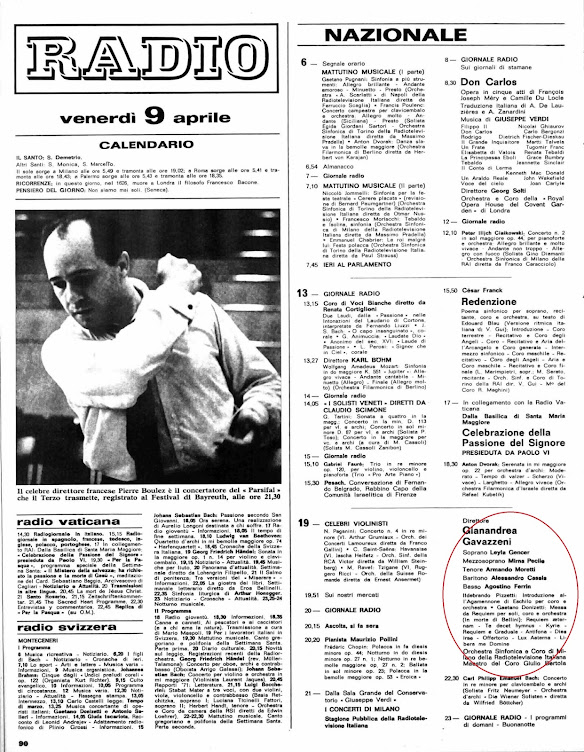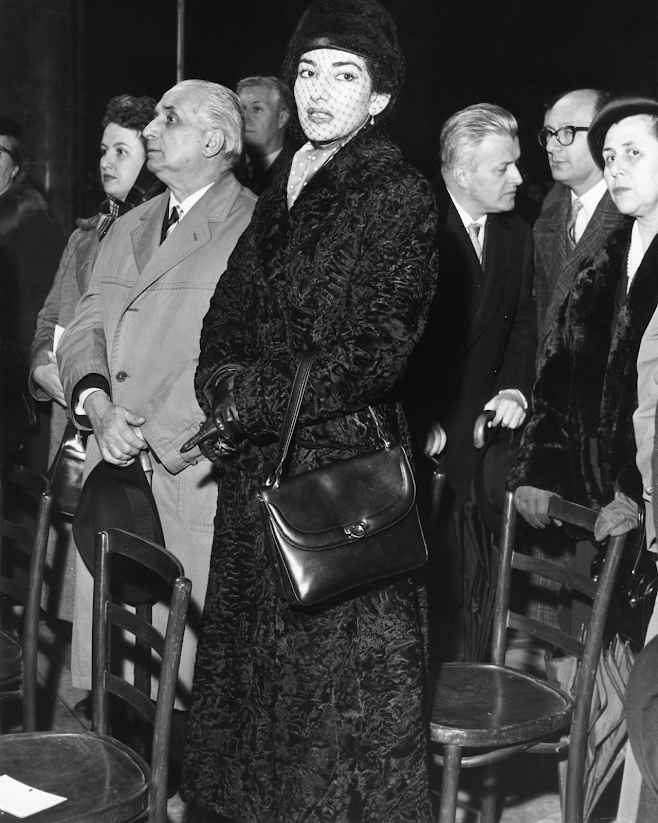THE ART MUSIC LOUNGE
2019.09.15
Donizetti’s Excellent “Requiem”
DONIZETTI: Messa de Requiem, “To the Memory of
Vincenzo Bellini” / Leyla Gencer, sop; Mirna Pecile, mezzo-soprano; Ennio
Carlo Buoso, ten; Alessandro Cassis, bar; Agostino
Ferrin, bs; Orchestra Sinfonica e Coro d Milano della RAI; Gianadrea
Gavazzeni, cond / Archipel ARPCD0475 (live: Milan, March 26, 1971)
I was poking around on the Naxos website for
reviewers, trying to see what recordings were available with soprano Leyla
Gencer, when I tripped across this release. At first, I thought it was a
misprint: a Requiem Mass by Donizetti? Surely, they were wrong. But
they weren’t.
Where they were wrong, however, was in the
identification of the tenor, listing one Armando Moretti instead of Ennio Buoso
¹; the elimination of the fifth
soloist, bass Agostino Ferrin, who sings on two numbers; and the year of the
performance, giving 1971 instead of 1961 ².
I found the correct listing of the soloists and the correct date on a posting
of this recording on YouTube, and checked it out. Ennio Buoso does have
one other posting on YouTube, singing “Vengo
à stringerti, dolce mia vita,” and by making a careful comparison I
determined that his was, indeed, the tenor voice on this recording, thus I also
accepted the later date. Another reason I believed the later date was that
soprano Leyla Gencer’s voice has here that unusual flutter which she only
picked up around 1965 or so. If you listen to Gencer’s earlier recordings, such
as the video of Il Trovatore with Mario del Monaco or the 1960 Don
Giovanni which I reviewed earlier on this blog, you will discover that she
did not have that flutter in the late 1950s/early ‘60s. But Archipel
is a small Italian label of indefinite origin with only three major outlets,
Naxos, Presto Classical and Berkshire Record Outlet, and I’m only too familiar
with how often the Italians get things wrong.
I doubt that many opera lovers will know (I sure
didn’t!) that Gaetano Donizetti wrote more than 100 sacred works, most of them
unpublished, although the majority of these are short occasional works and
academic exercises penned when he was being tutored by Simone Mayr. After 1824
he wrote only a few such works, a Miserere for voices and orchestra,
an Ave Maria, and this Requiem. It was the last of his
sacred pieces, begun in 1835 in memory of the death of Vincenzo Bellini, his
friend and rival in the opera houses. It was finished by December, when it was
to be performed, but for some unknown reason the plans for it fell through. It
was finally premiered in 1870, 22 years after Donizetti’s death, in a
performance heavily criticized by the Italian press for being weak. And that
was the end of its performance history in Italy until this performance was
given a century and one year later.
The work is often claimed to be “operatic,” but the
vocal writing bears only a small resemblance to Donizetti’s operas. The choral
and orchestral passages are richly detailed and quite dramatic, including some
rigorous counterpoint in the Kyrie and Lacrimosa. Another
interesting aspect is that the soprano and mezzo get very little to sing in
this work except in a few ensemble passages; most of the solo vocal writing is
given to the tenor and first bass (baritone), with a second, lower bass voice
added in two selections, the “Tuba mirum” and the “Confutatis maledictus.”
Because Gavazzeni hired the famous soprano Gencer for this performance, and she
wanted a solo to sing, he gave her the tenor’s “Ingemisco,” ³ a much slower, quieter and more lyrical
piece than the one by Verdi. (This may also have been conditioned by the fact
that the tenor in this performance, Ennio Carlo Buoso, was a “crossover” artist
of his time, like Kenneth MacKellar in the U.K. and Sergio Franchi in the U.S.)
Although this Requiem is not quite on the
same exalted level as those of Cherubini, which preceded it, or Verdi, which
followed it (and which was clearly influenced by Donizetti’s, particularly in
the “Dies irae,” it shares with the Requiems of those two composers
the fact that it is the greatest work that those three composers wrote. The
Cherubini Requiem is also little known, mostly because it has no solo
singers but only a chorus, yet as Toscanini’s recording proved it is a
masterpiece, and every opera lover worth his or her salt knows that the
Verdi Requiem is superb from start to finish.
Indeed, as you go through this work you will
continually discover outstanding passages. Although much of the music is
lyrical, none of it is banal. Donizetti avoids giving the singers high notes or
even melodic lines that resemble arias. Moreover, one can tell that this piece
was really written from the heart; at times, it is deeply moving.
There are two other recordings of this Requiem commercially
available, a live performance on Dynamic and a studio recording from 1988 on
Orfeo. The first of these has a rather weak conductor and defective singers and
adds a one minute and nine-second prelude played by an organ that I found
superfluous. The second of these features some outstanding singers,
particularly soprano Cheryl Studer and first bass Jan Hendrik Rootering, but
this edition adds much music that Donizetti meant to be cut from the finished
work and the conducting is so lacklustre as to make an “Adagio” of the entire
piece, robbing it of energy and vitality. That leaves only this one as really
good representative of the Requiem. Gavazzeni conducts it almost with the
energy of a Cantelli or Toscanini; both the orchestra and chorus give a much
better account of themselves than was usual for Italian forces of that era.
Occasionally, one of the solo voices seems to be a little off mic: Ferrin is
just barely audible in the “Confutatis maledictus,” which may be what gave
Archipel the idea that there was only one bass in the performance.
Regardless of the caveats mentioned earlier, this is a
piece, and a performance, that all music lovers should hear. It will give you
an entirely different perspective on the composer of such tripe as the “Queen
Trilogy” operas. (© 2019 Lynn René Bayley)
Follow me on Twitter (@Artmusiclounge)
or Facebook (as Monique Musique)

































